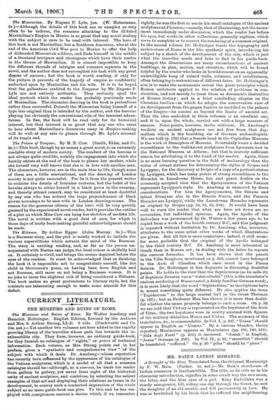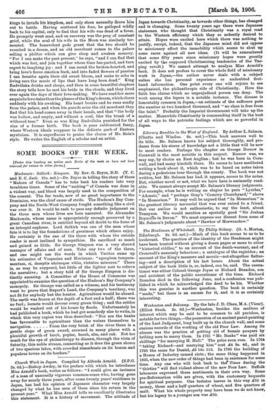MR. BAIN'S LATEST ROMANCE.
A Draught of the Blue. Translated from the Original Manuscript by F. W. Bain. (Parker. 5s. net.)—Mr. Bain's storehouse of Indian romances is inexhaustible. The title, as he tells us in his charming introduction, signifies in some occult way the new moon, the lotus, and the blue eyes of a girl. King Rudvidaka was a sturdy misogamist, till, riding one day through the forest, he met the daughter of an old ascetic, and fell passionately in love. He was so bewitched by his bride that he suffered the neighbouring kings to invade his kingdom, and only stern necessity drove him out to battle. Having scattered his foes, he galloped wildly back to his capital, only to find that his wife was dead of a fever. He promptly went mad, and on recovery was the prey of constant grief, while the soul of his wife in the Moon was similarly tor- mented. The benevolent gods grant that the two should be reunited in a dream, and an old merchant comes to the palace selling a philtre which can give sleep and awaken memory. "For I can make the past present," he says, " and I can find that which was lost, and join together whom time has parted, and turn regret to laughing joy : and I can mend the broken-hearted, and bring love's fierce emotion back, and into faded flowers of passion I can breathe again their old sweet bloom, and make to echo in living ears the music of lips that have long been dead." King RudvAlaka drinks and sleeps, and then in some beautiful chapters the story tells how he met his bride in the clouds, and they lived over again the days of their love-making. We have read few more exquisite love-tales than the phases of the King's dream, which closes Suddenly with his awaking. His heart breaks and he runs madly from the palace, and when his guards seize the old merchant they find that his head comes away in their hands, and that "the body was hollow, and empty, and without a soul, like the trunk of a withered tree." Even so was King Rudvalaka punished for the sins of a former birth. The book is pure sublimated fancy, where Western ideals reappear in the delicate garb of Eastern mysticism. It is superfluous to praise the charm of Mr. Bain's style. He writes the English of a scholar and an artist.











































 Previous page
Previous page